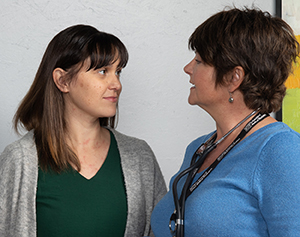Understanding Postpartum Blues
Having a baby is a happy, exciting time in a person's life. But it can also be tiring and overwhelming. Many new parents are surprised to find they feel sad or moody when adjusting to life with a newborn. But these feelings are very common. In most cases, they only last for 1 or 2 weeks after you give birth. This is called the “baby blues” or postpartum blues.
What are the postpartum blues?
You’ve just had a baby, and you’re overjoyed. But like many new parents, you may also feel sad, exhausted, anxious, and moody. You may cry a lot. If you have these and other mild symptoms of depression, it’s likely you have postpartum blues. And you’re not alone. About 4 in 5 new parents feel this way soon after giving birth.
Postpartum blues is a condition that comes and then goes away quickly. Symptoms often occur 1 or 2 days after giving birth. They may feel very intense for several days. But they go away on their own in about 2 weeks.
If you still feel this way after more than 2 weeks, or if at any time you start to feel worse, call your healthcare provider. You could have a more serious mood disorder called postpartum depression. This is treated with medicine and talk therapy (counseling or psychotherapy).
What causes the postpartum blues?
Experts don’t know the exact cause of postpartum blues. It’s likely linked to hormone level changes that occur during pregnancy and birth. During that time, your levels of estrogen and progesterone drop severely. This can trigger feelings of depression.
But other things may contribute as well. Having a baby is a major life change. And it can be a very stressful time. Caring for a new baby is emotionally and physically draining. You may be tired from lack of sleep. You may feel overwhelmed or lonely, or have trouble getting into a routine with your baby. All of these things can affect how you cope during this busy and emotional time.
Symptoms of the postpartum blues
Symptoms can include:
-
Sadness
-
Being grouchy
-
Crying
-
Mood changes
-
Trouble sleeping
-
Lack of energy (fatigue)
-
Not able to focus
-
Anxiety
Diagnosing the postpartum blues
There is no standard diagnosis for this condition. If you have 3 or 4 of the symptoms listed above after giving birth, you likely have postpartum blues.
Call your healthcare provider right away if your symptoms last for more than 2 weeks, or if your symptoms start to get worse. Your provider will evaluate you to make sure you don’t have postpartum depression.

Managing the postpartum blues
The postpartum blues generally go away without treatment. The best thing you can do to reduce your symptoms is to take care of yourself. To get the help and support you need, it’s important to:
-
Be open about your feelings. Talk with your partner or other people close to you about how you are feeling. Don’t keep things to yourself.
-
Get enough sleep. It may not be possible to sleep through the night right now. But rest whenever your baby naps. Don’t use that time to do chores.
-
Eat healthy foods. Eating a healthy diet can help you feel better, and help keep your mood more balanced.
-
Ask for and accept help. Let friends and family help out with meals, shopping, laundry, or watching other children.
-
Find other new parents to connect with. Check online to find a group for new parents in your area. Or ask your healthcare provider for suggestions.
Is it the baby blues or postpartum depression?
It’s normal to feel weepy, overwhelmed, and moody after having a baby. But if your symptoms last longer than 2 weeks or they get worse, call your healthcare provider. They will evaluate you to see if you have a more serious condition called postpartum depression. It’s important to get treated for that right away.